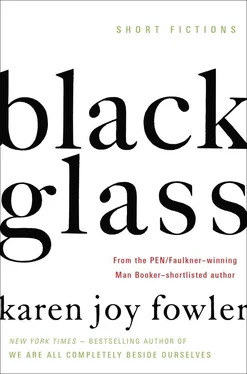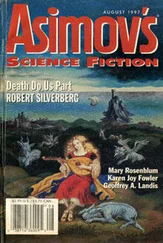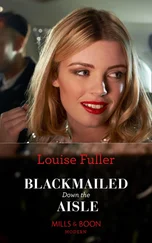“When I was growing up,” she said, “I lived on a block with lots of boys. Sometimes I’d come home and my knees were all scraped up because I’d fallen or I’d taken a ball in the face or I’d gotten kicked or punched, and I’d be crying and my mother would always say the same thing. ‘You play with the big boys and you’re going to get hurt,’ she’d say. Exasperated.” Alison unfolded the napkin, folded it diagonally instead. Her voice shrank. “I’ve been so stupid.”
“The universe is shaped by the struggle between two great forces,” the woman told her. It was not really responsive. It was not particularly supportive. Alison felt just a little bit angry at this woman who now knew so much about her.
“Good and evil?” Alison asked, slightly nastily. She wouldn’t meet the woman’s eyes. “The Elvis and the anti-Elvis?”
“Male and female. Minute by minute, the balance tips one way or the other. Not just here. In every universe. There are places”—the woman leaned forward—“where men are not allowed to gather and drink. Places where football is absolutely illegal.”
“England?” Alison suggested and then didn’t want to hear the woman’s answer. “I like football,” she added quickly. “I like games with rules. You can be stupid playing football and it can cost you the game, but there are penalties for fouls, too. I like games with rules.”
“You’re playing one now, aren’t you?” the woman said. “You haven’t hurt this man, even though you could. Even though he’s hurt you. He’s not playing by the rules. So why are you?”
“It doesn’t have anything to do with rules,” Alison said. “It only has to do with me, with the kind of person I think I am. Which is not the kind of person he is.” She thought for a moment. “It doesn’t mean I wouldn’t like to see him get hurt,” she added. “Something karmic. Justice.”
“‘We must storm and hold Cape Turk before we talk of social justice.’” The woman folded her arms under her breasts and leaned back in her chair. “Did Sylvia Townsend Warner say that?”
“Not to me.”
Alison heard more clapping at the bar behind her. She looked over her shoulder. The man in the blue sweater slapped his hand on the wooden bar. “Good call. Excellent call. They won’t get another play in before the half.”
“Where I come from she did.” Alison turned back as the woman spoke. “And she was talking about women. No one gets justice just by deserving it. No one ever has.”
Alison finished off her wine. “No.” She wondered if she should go home now. She knew when she got there that the apartment would be unbearably lonely and that the phone wouldn’t ring and that she would need immediately to be somewhere else. No activity in the world could be more awful than listening to a phone not ring. But she didn’t really want to stay here and have a conversation that was at worst too strange and at best too late. Women usually supported you more when they talked to you. They didn’t usually make you defensive or act as if they had something to teach you, the way this woman did. And anyhow, justice was a little peripheral now, wasn’t it? What good would it really do her? What would it change?
She might have gone back and joined the men at the bar during the half. They were talking quietly among themselves. They were ordering fresh drinks and eating beer nuts. But she didn’t want to risk seeing cheerleaders. She didn’t want to risk the ads with the party dog and all his women, even though she’d read in a magazine that the dog was a bitch. Anywhere she went, there she’d be. Just like she was. Heartbroken.
The woman was watching her closely. Alison could feel this, though the woman’s face remained shadowed and she couldn’t quite bring herself to look back at her directly. She looked at Elvis instead and the way his eyes wavered through her lens of candlelight and tears. Lonesome tonight? “You really have it bad, don’t you?” the woman said. Her tone was sympathetic. Alison softened again. She decided to tell this perceptive woman everything. How much she’d loved him. How she’d never loved anyone else. How she felt it every time she took a breath, and had for weeks now.
“I don’t think I’ll ever feel better,” she said. “No matter what I do.”
“I hear it takes a year to recover from a serious loss. Unless you find someone else.”
A year. Alison could be a mother by then. How would she find someone else, pregnant like she was or with a small child? Could she spend a year hurting like this? Would she have a choice?
“Have you ever heard of Laura D. Fair?” the woman asked.
Alison shook her head. She picked up the empty wineglass and tipped it to see if any drops remained. None did. She set it back down and picked up the napkin, wiping her eyes. She wasn’t crying. She just wasn’t exactly not crying.
“Mrs. Fair killed her lover,” the woman told her. Alison looked at her own fingernails. One of them had a ragged end. She bit it off shorter while she listened. “He was a lawyer. A. P. Crittenden. She shot him on the ferry to Oakland in November of 1870 in front of his whole family because she saw him kiss his wife. He’d promised to leave her and marry Mrs. Fair instead, and then he didn’t, of course. She pleaded a transient insanity known at that time as emotional insanity. She said she was incapable of killing Mr. Crittenden, who had been the only friend she’d had in the world.” Alison examined her nail. She had only succeeded in making it more ragged. She bit it again, too close to the skin this time. It hurt and she put it back in her mouth. “Mrs. Fair said she had no memory of the murder, which many people, not all of them related to the deceased, witnessed. She was the first woman sentenced to hang in California.”
Loud clapping and catcalls at the bar. The third quarter had started with a return all the way to the fifty-yard line. Alison heard it. She did not turn around, but she took her finger out of her mouth and picked up the napkin. She folded it again. Four small squares. “Rules are rules,” Alison said.
“But then she didn’t hang. Certain objections were made on behalf of the defense and sustained, and a new trial was held. This time she was acquitted. By now she was the most famous and the most hated woman in the country.”
Alison unfolded the napkin and tried to smooth out the creases with the side of her palm. “I never heard of her.”
“Laura D. Fair was not some little innocent.” The woman’s hat brim dipped decisively. “Mrs. Fair had been married four times, and each had been a profitable venture. One of her husbands killed himself. She was not pretty, but she was passionate. She was not smart, but she was clever. And she saw, in her celebrity, a new way to make money. She announced a new career as a public speaker. She traveled the country with her lectures. And what was her message? She told women to murder the men who seduced and betrayed them.”
“I never heard of her,” said Alison.
“Mrs. Fair was a compelling speaker. She’d had some acting and elocution experience. Her performance in court showed training. On the stage she was even better. ‘The act will strike a terror to the hearts of sensualists and libertines.’” The woman stabbed dramatically at her own breast with her fist, hitting Elvis right in the eye. Behind her hand, Elvis winked at Alison in the candlelight. “Mrs. Fair said that women throughout the world would glory in the revenge exacted by American womanhood. Overdue. Long overdue. Thousands of women heard her. Men, too, and not all of them entirely unsympathetic. Fanny Hyde and Kate Stoddart were released in Brooklyn. Stoddart never even stood trial. But then there was a backlash. The martyred Marys were hanged in Philadelphia. And then…”
Читать дальше












